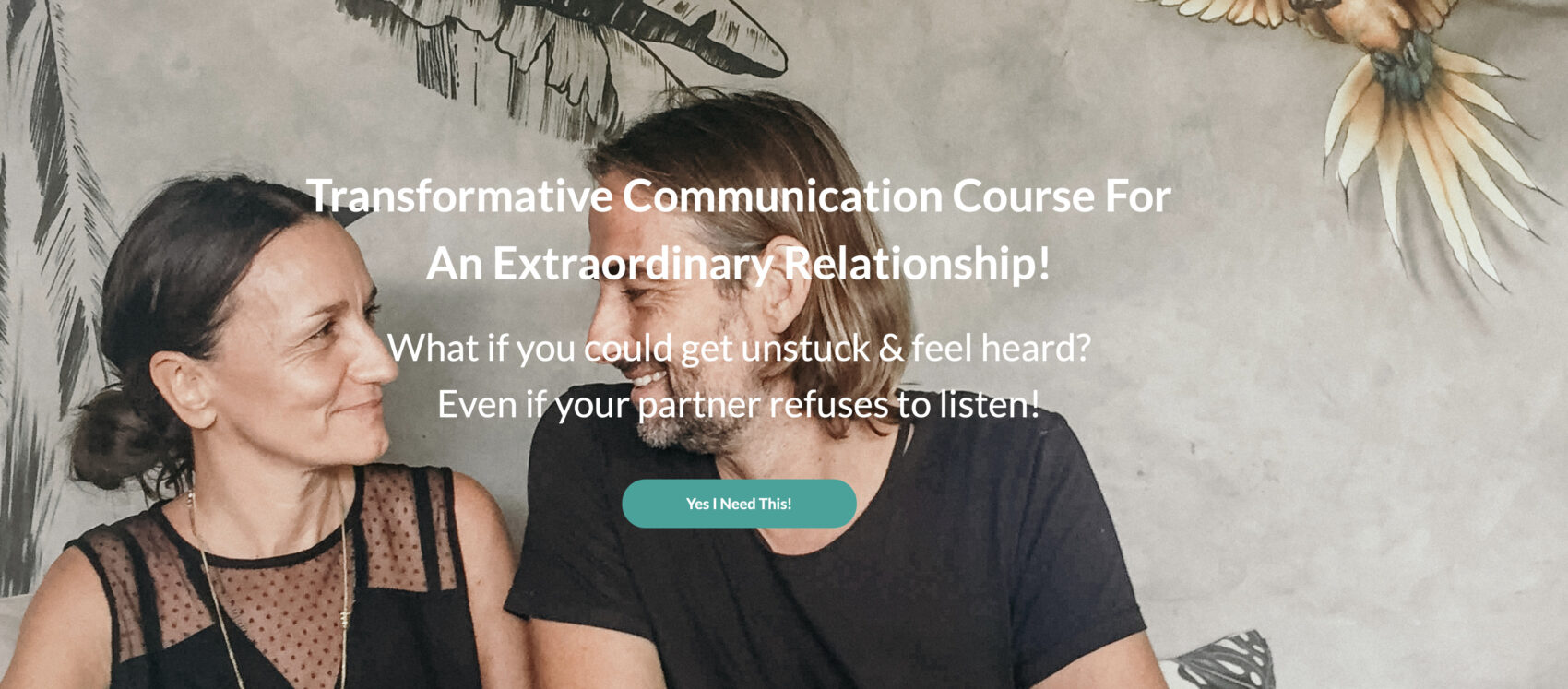everything you need to know about online marriage counseling

Transforming your relationship positively through online couples therapy
By saying ‘I do,’ you have committed to experiencing ups and downs with your partner, as it is only natural when sharing your life to experience fluctuations in the relationship. The good news is that both you and your partner can access teachings that help you cope with this and strengthen and grow your relationship. Whether you’ve been together for 18 months or 18 years, online couples therapy is an excellent solution to difficulties in your relationship and a very effective way to grow in your love life!
Yes, modern tools can solve relationship issues.
Online couples therapy is one of the most accessible and effective ways to create a reasonably quick transformation.
If this sounds abstract, if you have doubts about the effectiveness of such a therapeutic approach, or if you want to know more about the subject, I invite you to read this article.
You will find answers to your questions that will allow you to consider solutions to your couple’s problems and to make the choice of a fulfilling love relationship.
Watch Sophie & Jesse’s Free Webinar NOW : From Conflicts to Deeper Connections
Online couple therapy, as a way to transform yourself and your relationship

Couple therapy leads to a self and relationship transformation path, whether online or in the office.
And without going that far, it allows, by the simple fact of engaging in it, to reconnect with intimacy and what initially attracted the partners to each other.
In other words, marital therapy can help rekindle the flame! But there is more to it than that. Here are some of the things it can do:
- Engaging in couple therapy helps the partners establish a new relational foundation based on mutual respect.
- It provides a safe space to talk about complex issues to address together.
- By allowing honest expression of the couple’s problems, therapy allows everyone to feel heard and find solutions.
- The practical communication skills learned in the therapy sessions promote harmony and peace in the couple and benefit the children and people around them.
- The couple therapist’s analysis and external, professional viewpoint enable the emotions and feelings experienced by the partners to be seen in a new light, to be positively transformed, and to access each other’s needs.
- Couple therapy allows the couple’s weaknesses to be transcended and their strengths valued.
As a result, the partners no longer use each other’s shortcomings against each other and experience a healthy and joyful relationship.
Look into the online workshop >>> Transformative Communication For An Extraordinary Relationship
Couple therapy is also a process that allows the healing of past wounds to no longer impact the relationship and our lives.
Along the way, partners learn to use concepts and tools that enable them to radically improve their communication, practice positive conflict resolution, and grow in their relationships.
At the end of couple therapy, partners sometimes decide to separate or stay together by confronting these feelings and shedding light on the underlying causes of discord in the relationship.
In either case, their decision is based on a peaceful and caring understanding and allows them to live closer to their true nature.
When is the right time to use an online couple therapist?
There are indicators that you and your partner may benefit from online couple therapy. Here are a few that you and(or) your partner may be familiar with:
- Conflicts between you based on an unclear communication pattern are escalating.
- You feel loneliness and emotional distance from your partner.
- You say you love each other but are not in love.
- You have problems with trust and commitment and difficulties relying on each other.
- You fail to make the other person’s well-being a priority.
- You tend to fear separation.
- Your dependence sometimes makes you intrusive.
- Your partner’s excessive independence makes you feel unimportant or unloved.
- You feel emotionally unsupported or even ignored.
- You find it difficult to open up and express your feelings to your partner.
- You have little or no sexual intimacy, lack desire, and(or) the subject of sex is rarely discussed between you.
- Problems with work, friendships, social pressures, finances, etc., are affecting your relationship.
- Your addiction (alcohol, drugs, sex, etc.) or your partner’s addiction is having a severe impact on your relationship.
- Your disagreements about the education of your children lead to conflicts between you.
- The distribution of domestic responsibilities seems unfair, creating recurrent conflicts between you.
- Anxiety or depression that you (or your partner) suffer from is untreated and weighs on your relationship.
- Unequal decision-making within the couple is subject to conflict or frustration.
- You (or your partner) are verbally and(or) physically abused.
- You or your partner is having an affair.
- Your relationship is constantly under stress.
- Conflicts affect the partners’ mental and physical well-being and harm your children (if you have any).
- Your brutal confrontations often lead you to say things that deeply hurt your partner.
- The emotional distance between you and your partner grows, and instead of building a bridge back to each other, you widen the gap between you through a lack of clear communication.
If you recognize your relationship and(or) yourself through some of the causes listed above, it is time to take charge of your relationship and get help
Also read >>> Healy Energy Frequency Device Review
However, every couple could use some guidance on better communicating or positively expressing their feelings and needs.
As a relationship expert, Dr. John M. Gottman explains, “Every relationship requires an effort to stay on track; there is a constant tension between the factors that keep you together and those that pull you apart.
The quality of exchanges in most relationships is indeed affected by negative emotions:
When you feel disappointment, sadness, fear, or resentment towards your partner, it is a sign that something needs to be addressed and that getting help may be necessary.
The mistake often made is to wait until significant problems arise before engaging in couples therapy.
According to Dr. John Gottman, couples endure difficulties for an average of six years before seeking help. Yet empirical research on online couples therapy has shown that 70 percent of couples who seek help experience positive changes in their relationships.
I sometimes advise young couples to seek premarital therapy, even though they have not faced difficulties.
It can be beneficial for them to acquire tools that will enable them to move their relationship forward when it shows signs of stagnation.
Also, developing practical communication and positive conflict resolution skills will be substantial when their honeymoon period is over.
Why is there resistance to seeing a couple’s therapist?
The first step in dealing with problems in a couple is to recognize that there are difficulties and then agree to seek help.
However, many couples are reluctant or even refuse to seek help from a therapist if they need it, even though there is evidence that it can create the desired change.
But why is there such resistance?
It is partly due to the stigma attached to couples therapy in general and online therapy in particular. But there are other reasons why many people hesitate to seek help:
- Seeing a therapist leaves the impression that the couple cannot solve their problems, sometimes challenging to accept.
- Seeking help implies something is dysfunctional in the relationship, which may be difficult for spouses to admit.
- Fear of discovering the partner’s lack of love, infidelity, or ending the relationship may hinder.
- The tendency to consider that it’s the other person’s fault if the relationship has issues can prevent one from seeing what couple therapy can bring.
- Believing that a relationship that requires effort is not good encourages denial of the difficulties.
- Consulting a therapist costs money.
- Fear of sharing personal and intimate information with a stranger can create a blockage (“dirty laundry should stay in the family”).
- Believing that overcoming marital problems takes years is discouraging.
- The belief is that staying married (for financial reasons, for the children, etc.) is most important regardless of the state of the relationship.
One of my clients, whom I supported through online couples therapy, was “overwhelmed by the fear of addressing the issues in therapy, which would only make things worse.”
Her fear of having the problems discussed was more prevalent than her willingness to find a solution to relieve the pain.
She identified and understood her tendency to avoid conflict in her therapy sessions and worked around this obstacle.
This process enabled her to then address her concerns positively with her partner.
Another of my clients waited many years for her partner to be ready to enter couples therapy.
Finally, after a first session, she realized that her partner would probably follow if she started the work alone.
In any case, her personal transformation experience would be a first step towards transforming their relationship.
When there are problems in the relationship, it affects the emotional well-being of each partner.
Therefore, avoiding help can lead to more significant and more severe problems in the future.
The critical issues discussed in online couples counseling can be challenging, but your relationship is worth it, and counseling does not have to be a long process.
Moreover, it is an opportunity in couples therapy to do some work on yourself, as this always leads to individual work.
Also read >>> 5 ways to invite your partner to attend couples therapy
Choosing a couple’s counselor or therapist and feeling confident.

A couple’s therapist is an excellent expert in helping partners express their most vulnerable emotions in a confidential and safe space.
By identifying their core issues and bringing them to their attention, they help the partners to eliminate their toxic patterns and develop techniques to improve their communication and regain intimacy.
Therefore, for therapy to be successful, it is essential that you feel comfortable during your sessions.
Compare couples therapy specialties and therapeutic practices before embarking on online therapy.
The therapist’s principles should be as close as possible to your own, and their approach should fit you.
Some of them have local clinics you can visit and(or) websites with valuable testimonials. Feel free to check out their pages and find out more about them.
Referrals are, in my opinion, a very effective way of accessing a therapist who is right for you.
Being advised and then guided by someone you trust means that you don’t get lost in endless searches and increases the chances of finding the right person quickly.
In addition, knowing in advance what you can expect from your couple therapy sessions makes the process go more smoothly.
Once you have chosen a couple’s therapist, it may take some time to establish a relationship with them. Before revealing sensitive information:
- Take time to develop a sense of trust with them.
- Start by talking about simple problems; you can ask for advice and see if their approach suits you.
- Don’t be afraid to speak to them about your feelings of mistrust in the process.
Most marriage counselors offer an assessment session first to see a fit between them and their client, then work through sessions or follow a program.
This assessment also benefits the partners by allowing them to “feel out” the relationship with the therapist.
However, it may take a few sessions to feel completely comfortable and open up freely.
So, if you will engage in couples therapy, be patient and allow yourself enough time to formulate your opinion before deciding to contact a new therapist (unless you have a very uncomfortable experience).
Finding a therapist who gives you enough space to express yourself and with whom you feel confident is essential to dispel your apprehensions and enable you and your partner to move forward together.
Why choose online couple therapy over in-person counseling?

Thanks to technology, couples willing to leave their comfort zone and engage in counseling can now access the best professionals: distance is no longer an issue.
Partners can now attend sessions with therapists of their choice wherever they are in the world, and without the possibility of using travel as an excuse to cancel an appointment at the last minute.
Usually, most couples who choose online couples therapy over in-office therapy sessions do so for four important reasons:
- The therapist comes highly recommended, but they don’t live in the same area or even in the same country.
- Their days are long, and they appreciate not having to endure the traffic jams after work to get to the therapist’s office and having to wait in the waiting room before their appointment.
- They have busy schedules, and it is more relaxing to be at home with a cup of tea to start their session.
- They often benefit from support and follow-up via email outside of the sessions, which in some cases allows them to move forward more quickly and feel more supported.
Online couple therapy has another advantage:
The therapist benefits from the advantages of working in the field.”
Les séances ayant lieu au domicile du couple, les partenaires se sentent en confiance pour plonger dans un univers qui pourtant ne leur est pas familier.
Addressing the problems encountered in their original context allows the couple to be more authentic.
How many online couple therapy sessions are required?
The number of sessions will depend on your availability, the severity of the difficulties you are experiencing, and the willingness and energy you have to work through them.
In general, couples whose problems are more serious and related to deep-seated wounds may need more sessions than couples whose difficulties are less critical and connected to external, transient events.
Also Read>>> My Wife Yells at Me
Your therapist will meet with you and your partner to assess the approximate number of sessions you will need and discuss the format that best suits your schedule and availability.
How can I get the most out of an online couple therapy session?
To get the most out of online couple therapy, here are my recommendations:
1. Make sure you have the desire and intention to change.
There can be no transformation without a desire for evolution and change.
That may seem obvious, but sometimes couples are under the illusion that they mean to do so. In any case, if you have read this article so far, you are likely ready and willing to live and approach your relationship from a new perspective.
Therefore, you are beginning your journey, leading you to a happy couple’s life if you and your partner desire.
2. Make a serious commitment.
The effectiveness of couple therapy depends heavily on both partners’ willingness to make progress, the timing of the sessions, and the commitment and attendance of the partners.
Knowing when and how often to consider sessions and then sticking to them is a good starting point. Paying for your sessions in advance is an effective strategy for maintaining your commitment.
Many therapists also offer package deals to increase motivation and keep regular work, which is key to the success of the therapy.
3. Create a supportive environment for your therapy session.
Take advantage of the benefits of online marital therapy: Choose the room where you feel most comfortable, the chair or armchair where you will be cozy without the risk of nodding off, or prefer an outdoor session on your balcony, in your garden, or a park.
The atmosphere in which you feel most connected to your partner, the settings that bring you back to your relationship (photos of you and your partner in the background or on the shelves in front of you, etc.) may be the most productive for your session.
4. Make sure you are both comfortable with your therapist.
Even though a therapist is trained to be impartial, their personality may, in rare cases, be more compatible with one person than the other.
That can create misunderstandings, such as one person feeling misunderstood and their partner is not ready to engage in therapy.
So make sure that neither feels biased in their relationship with the therapist.
However, don’t forget what I said at the beginning of this article: It can take several sessions to develop a relationship of total trust with a therapist.
Especially as sometimes what may seem unfair and biased to you may reveal fears, beliefs, or insecurities that you will need to work on in individual or couple sessions.
Also read >>> Marriage counseling for an extraordinary relationship
5. Be patient.
Like any other form of treatment, couples therapy can sometimes take a while before you see substantial improvements.
Sometimes the situation may even worsen before it gets better: this is not to be feared, as it is part of the process.
It is more noticeable when years of bad habits have taken hold in the relationship.
Patience and gentleness towards your partner and yourself will help you welcome your therapy experience and keep faith in what is.
6. Make an effort and persevere.
Everything worthwhile in life requires effort.
For example, the pianist practiced his instrument daily before mastering it; the student worked steadily on his courses to get his degree; the long-distance runner trained every day before running a marathon.
Likewise, you may have hired a sports coach to help you get in better shape, and relationships, especially long-term ones, are no exception to this rule.
Couples therapy is a process that requires some personal investment and application of the concepts and tools that the therapist delivers.
Between sessions, please do your homework and apply the procedures your therapist suggested you follow, then make efforts to care for and support each other.
Again, practice and perseverance are the keys to accessing new patterns and enabling lasting change in the relationship.
Entering online couple therapy requires willpower and courage in itself. So make sure to use these two attributes throughout your therapy, and you will reap the full benefits.
7. Define a strategy for calming down after your sessions.
If possible, give yourself some extra time after the session and before returning to your day’s activities.
Sometimes you may feel tired after a session, and you may need to decompress before returning to the hustle and bustle of everyday life.
In addition, “digesting” the session together can be very beneficial: taking a walk in the fresh air, sharing a meal, drinking tea in a café, etc., can be particularly therapeutic!
8. Be aware of how you communicate.
If a great friendship involves open and honest communication, so do relationships.
Throughout the therapy process and until it becomes a habit, make the extra effort to communicate authentically and kindly with your partner.
The work involved will sometimes make you more vulnerable. Be tolerant and welcome each other’s emotions as much as possible, in love.
But don’t worry too much about this.
Whatever your mode of communication, your therapist will be able to identify it and guide you. Helping you express your truth while remaining kind and impeccable with your words is part of their mission.
So stay confident: It is possible to communicate peacefully despite disagreements in a couple, and therapy is there to help you experience this.
Also read >>> Best Online Yoga Teacher Training
Look for the EXTRA in the ordinary.
While no relationship is perfect, that doesn’t mean you have to settle for less than you deserve. Instead, seeking the advice of a qualified therapist can give you the support you need to overcome difficulties and create an extraordinary relationship.
The critical thing to remember is that the goal of online therapy is to teach couples to work together rather than against each other.
Therapists, coaches, and counselors are trained to help spouses see themselves as equal partners rather than adversaries.
Helping them heal the wounds of their past where necessary, and providing advice and tools to establish genuine and caring communication between them, enables them to see and accept each other as they are, rather than as the other thinks they should be.
But this work does not happen without the will and commitment of the couple. To be transformed, the partners must be willing to change personally and embark on the adventure that will fulfill their relationship!
So, if you want this change deep inside you and you are ready to live your relationship to its highest infinite potential, start to follow the bits of advice I have given you and engage in couple therapy.
The tools, concepts, discoveries, and teachings that your online therapist will make available to you will allow you to strengthen your connection and intimacy to embark on the path of the love relationship you want!

In case you are still hesitant to make the step to talk to a real person, and to support you on your journey to transform your relationship, my husband and I have created a four-hour online communication course called Transformative communication for An Extraordinary Relationship which includes concrete examples, exercises, role-plays, and strategies that you can use immediately.
With this online teaching we aim to help you improve the quality of your communication as a couple by learning to express yourself authentically to strengthen your intimacy and grow your relationship in a caring way.
Find out more about the online course – Transformative Communication For An Extraordinary Relationship– by Relationship & Communication experts, NLP coach, Sophie Parienti and Jesse Gabler.



